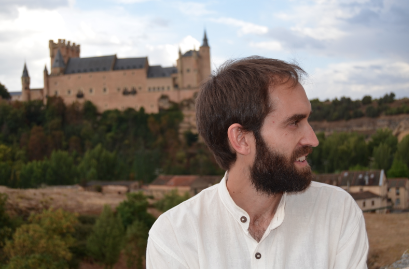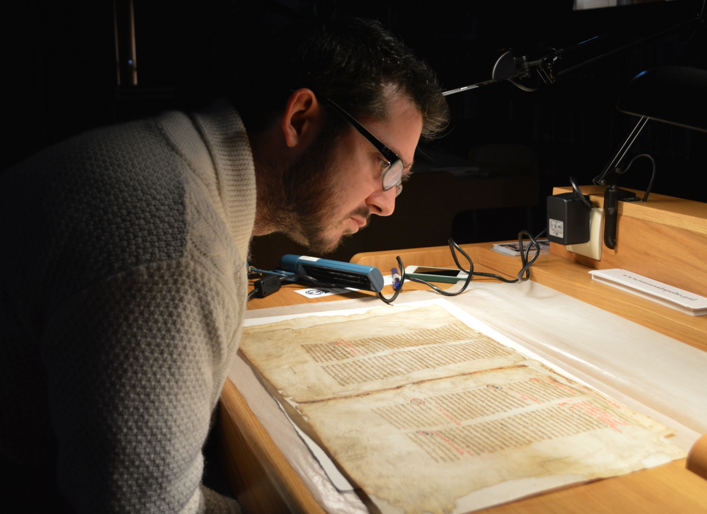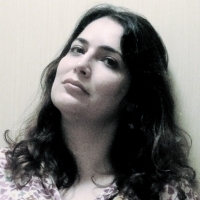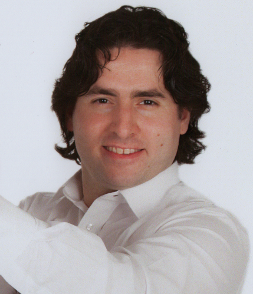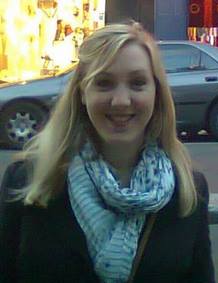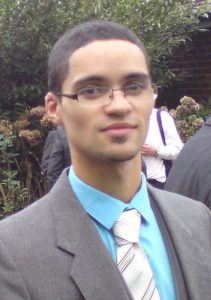Dr. Aengus Ward
- General editor of the Estoria Digital and responsible for editorial decisions.
- Establishment of base text and numbering
- Transcriptions and proofreading of transcriptions
- Collation and establishment of edited text
- Introductory materials
Personal webpage (Birmingham)
I have been a lecturer in the Department of Modern Languages (Hispanic Studies) since 1994. I teach medieval Spanish literature and Spanish language and linguistics. My research interests lie in the fields of medieval Spanish history and historiography, textual editing, diachronic phonology and syntax.
The Estoria project emerges from my interest in medieval Iberian chronicles and my previous ventures into the world of textual editing. We aim to produce a digital edition of the Estoria de Espanna by the end of 2016, but we also hope to create a series of tools which will engage a wider audience with the history of Iberia and the superb medieval manuscripts that preserve the Estoria.
Email
***
Dr. Fiona Maguire
Dr Maguire is a research fellow on the Estoria de Espanna Digital Project.
- Initial conversion of E1 and E2 to xml
- Technical aspects of transcription
- Transcription of Ss and correction and proofing of various transcriptions
- Impact and development of digital tools
- Establishment of indices, maps and prosopographical tools
***
- Transcription of manuscripts T and Q
- Correction and proofing of transcriptions, especially Ss
- Development of Impact tools: teaching materials and exhibitions
- Development of reader’s edition
- Introductory essay on Alfonso el Sabio
- Graphic outlines
Dr Jerez joined the team in October 2014, as a research fellow. For nine years (1997-2006) he worked in the Biblioteca Nacional in Spain as part of the Golden Age Research Project led by Pablo Jauralde. His role involved cataloguing Castilian poetry manuscripts dating from the 16th and 17th centuries. He has been involved in research into textual criticism and the history of the historiography studied by Diego Catalán, with whom he worked closely for five years in the preparation of the monograph Rodericus romanzado (FRMP, 2005). He also completed his PhD thesis under the direction of Professor Catalán, on the topic of the ideological motivations and composition techniques of one of the principal Alfonsine sources, the Chronicon mundi by Lucas de Tuy. These days, Dr Jerez’s interests have widened to the study of narrative symbolism in medieval literature, and in particular the frontier between Legend and History.
***
Dr. Ricardo Pichel Gotérrez
- Transcription and correction of T (and others)
- Development and general editing of the reader’s edition
- Manuscript description
- Archive liaison
- Graphic outlines
Ricardo Pichel joined the team in April 2015 and remained in Birmingham as an Honorary Research Fellow until spring 2016 as part of his postdoctoral contract with the Universidade de Santiago de Compostela. This was followed up by stays at King’s College London, the Hispanic Society of America (New York) and the University of California (as a research fellow for PhiloBiblon). A graduate of Galician and Hispanic Philology, he completed his PhD thesis (2013) on the edition and study of the fourteenth-century bilingual Historia troyana (BMP 558). He has taught at the Universidade de Santiago de Compostela (2006-2009) and the Universidad Complutense de Madrid (2011-2014). He is also a researcher for the Instituto da Lingua Galega, where he is involved in several research projects such as “Xelmírez. Corpus lingüístico da Galicia medieval” and “Biblioteca Dixital da Galicia medieval”. Furthermore he is the principal researcher of the Galician team within the International Network CHARTA. At present, he is working on the digital edition and study of several medieval texts (such as the Galician translations and versions of the General Estoria and the Estoria de Espanna, the Crónica de 1404 etc.) with a view to incorporating them into his postdoctoral project, the “Corpus de Textos Antigos de Galiza”.
***
Dr. Bárbara Bordalejo
- All aspects of technical details initially
- Transcriptions
- Development of transcription guidelines
Personal webpage
Barbara Bordalejo is a digital humanist and a textual scholar with a background in English Literature. She has published electronic editions of Chaucer’s Canterbury Tales, Darwin’s Origin of Species and 15th Century Spanish Cancioneros. Her interests focus on textual criticism with particular emphasis in electronic editing and the use of computer methods to study texts, collation of large textual traditions, the history and future of the book and transmedia storytelling. She teaches digital literature and new media, English and American literature. She is a member of the executive of Global Outlook: Digital Humanites.
Email
***
Zeth Green
- Software development
Personal webpage
Personal webpage (Birmingham)
I am a developer and researcher working in the digital arts and humanities, primarily on electronic editions and tools concerning the New Testament and other ancient works. I am the software developer on the project.
Email
***
Polly Duxfield
- Transcription of E1 and Q
- Crowdsourcing
- Preparation of the reader’s edition
- Development of transcription training
- Index building
- Conference administration
Personal webpage
I came to the Estoria Digital project through my background in sociolinguistics and as an ex-student of Aengus’s here at the University of Birmingham, where I completed both my BA and my MPhil. I spent my year abroad in Santiago de Compostela where I became interested in Galician sociolinguistics, which was the topic of my MPhil. After my masters I qualified as a teacher and taught first in a primary school, specialising in MFL, then at secondary schools in Worcestershire, teaching GCSE and A Level French and Spanish. My main academic interests lie in sociolinguistics, but participating in the EDIT project has allowed me to develop my interests in the use of crowdsourcing for digital transcription projects and textual editing using digital humanities.
Twitter: @pollyduxfield
Email
Christian Kusi-Obodum
- Transcription of E1, T and Q
- Development of transcription training
- Preparation of the reader’s edition
- Index building
- Conference administration
I began working as part of the Estoria Digital programme at the start of 2014 as a Birmingham alumnus and having been taught by Aengus Ward. During my year abroad I studied in Lisbon and Oviedo, allowing me to experience the amazing cultural and linguistic variation in the Iberian Peninsula. After graduation I trained to be a French and Spanish teacher in Reading, and after a short time teaching English in Poland I returned to the University of Birmingham to help with the Estoria project. I am excited to be exploring historiography, especially in the case of medieval Iberia, the frontier por excelencia between Christendom and the Islamic world. I’m keen to develop skills in palaeography and textual editing, as it will bring manuscripts right into the modern age, offering new dynamics for historical analysis. Outside of work I enjoy creative writing, as well as challenging myself to hold my balance on a ‘slackline’, otherwise known as tightrope walking!
***
Marine Poirier
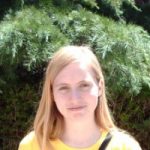 Personal webpage (Rennes 2)
Personal webpage (Rennes 2)
I am currently a contractual doctoral student (‟allocataire-monitrice”) in Spanish linguistics at the University of Rennes 2 and research assistant on the Estoria Digital project in Birmingham. After a Master’s degree prepared at the Universities of Rennes and Salamanca with a dissertation on the Estoria (2011) and French agrégation (2012), I worked as a teacher at a secondary school in Rennes, teaching Spanish A level.For any further information, you can see my personal webpage above.
Email
***
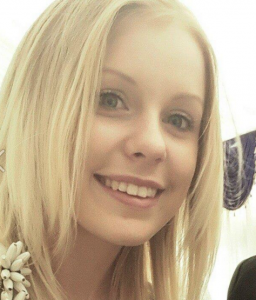 Lauren Brinsdon
Lauren Brinsdon
Lauren joined us during the summer of 2016 during which time she worked on translating into English the materials created by Enrique for the impact project.
Estoria de Espanna Digital project main team
The project was led by principal investigator Dr. Aengus Ward of the University of Birmingham, UK. The research fellows on the project were Dr. Bárbara Bordalejo (senior research fellow, KU Leuven), Fiona Maguire (University of Birmingham), Dr. Enrique Jerez Cabrero (University of Birmingham) and Dr. Ricardo Pichel Gotérrez (postdoctoral research fellow, Universidade de Santiago de Compostela and Universidad de Alcalá). The doctoral students on the project were Christian Kusi-Obodum (University of Birmingham) and Polly Duxfield (University of Birmingham). The software developer was Zeth Green.
Advisory board
The advisory board for the project was made up of Professor Leonardo Funes (Universidad de Buenos Aires), Dr. Francisco Bautista (Universidad de Salamanca), Dr. Virginie Dumanoir (Université Rennes 2), Dr. Manual Hijano (Durham University), Dr. Geraldine Hazbun (University of Oxford) and Dr. Juan-Carlos Conde (University of Oxford).
Extended team
We were joined for periods of time of varying length by doctoral students Marine Poirier (Université Rennes 2, France), Alicia Montero Málaga (Universidad Autónoma de Madrid, Spain), and Javier Sebastián Moreno (Universidad Autónoma de Madrid, Spain). During the summer of 2016 we were joined by Lauren Brinsdon, an undergraduate student (University of Birmingham). We received considerable technical expertise from Professor Peter Robinson (University of Saskatchewan) and Xiaohan Zhang (University of Saskatchewan) regarding the transcription phase of the project. Michael Pidd (University of Sheffield) was the digital director of the impact project, linked to the main EDIT project. Nick Leonard was a crowdsourcer for the project, and was a particularly productive volunteer.
Crowdsourcers
The most active volunteer transcribers for the project were:
Nick Leonard
Gustavo Riva
Avellana Ross
Silvia Yusta Fernández
Other volunteers who produced transcriptions or carried out transcriptions tasks for the project were:
Lauren Brinsdon
Iara Cardo
Carlos Darwing
José Fradejas
Emily Francomano
Leonardo Funes
Jordan Grantham
Juan Lacalle
Alicia Inés Málaga
Olga Mendez Gonzalez
Sé Mouthaan Ward
Irene Salvo García
Pablo Saracino



